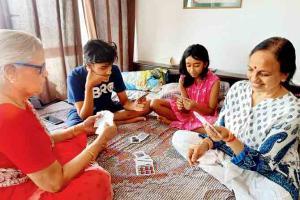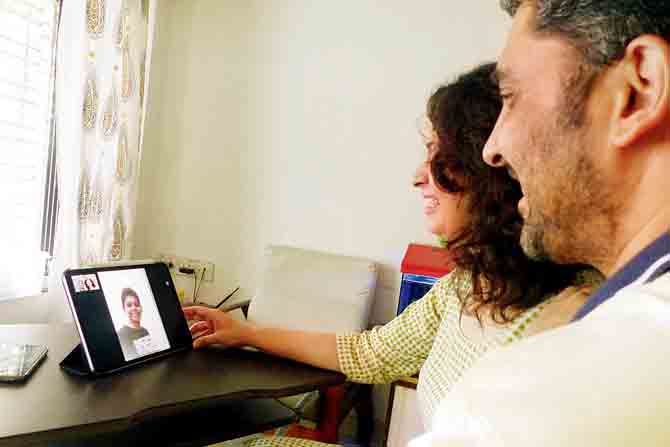In a matter of days, their tiny worlds have turned upside down. How should parents and families explain to children what's happening around the world?

Rajni Arunkumar, content editor, First Moms Club, says her children had stopped playing out in the last week of school itself as precaution since they have old grandparents living with them
Thane resident Natasha Vaidya Karkhanis' seven-year-old son is a fan of Dr Binocs. On his show on YouTube, the cartoon character Dr Binocs had explained all there was to know about the Coronavirus and how to take precautions to prevent contracting and spreading infection. "It made my job easier since all the queries were answered in the simple video," says Karkhanis, who tutors students of Class X. "My students and my daughter in the seventh grade are mature to understand what is happening but the younger kids are more sensitive, so you have to be pragmatic about breaking bad news to them," she adds. Her husband is currently the primary caregiver to their kids, ensuring they are occupied with family video chats, learning activities, playtime and watching comedy movies from the 1990s.
ADVERTISEMENT
"We don't watch news. It's depressing for kids. While my son isn't feeling bad about not going to school, he is missing his little cousin and not being able to go down to cycle. He found wearing the mask funny, but when we showed him on Google how people in Japan wear masks regularly as a safety measure, he understood immediately," says Karkhanis.

Clinical psychologist Dr Manasi Bhat's teenage son is with his extended family in Pune. His parents communicate with him over video calls through the day. She says, "What bothers him is when is this going to end. The simple answer I gave him is, soon…really soon. Let's take it day by day. Because it's hope against the fear."
Books and stories are a great way to make children understand the concept of fear and how it can be handled. Molly Watts, a Southampton intensive care nurse has created a free e-picture called Dave the Dog, which is the story of an owl called Nurse Dotty who explains the infection to Dave, and in turn gives children tips on how to avoid the virus.
Rajni Arunkumar, content editor, First Moms Club, a community for Indian mothers, believes communication is the key. "My son is in the ninth grade and watches the news with us. The younger one is in fourth grade and had some questions which we answered as honestly as possible. We'd actually stopped the children from playing out in the last week of school itself to reduce social interaction. The lockdown was an extension of that. We have three parents above 60, so we needed to be more careful. One of them especially, since she's been diagnosed with cancer. When we sat down with the children to explain this, they understood," says Arunkumar.
Vile Parle-based clinical psychologist Dr Manasi Bhat, recommends offering comfort and honesty to kids. "Don't misguide them by creating unrealistic positivity. They need honest age-appropriate answers. Sometimes, especially with the younger children, what bothers them is no play time outside. Find ways to calm them down and keep them occupied indoors."
Dr Swati Popat Vats, president, Early Childhood Association and Association for Primary Education and Research, suggests setting a daily routine. "A routine calms the brain. Having said that, be sensitive to moodiness as well. Staying at home is going to take a strain on their emotions, so ensure that if their feelings are going haywire, yours should be stable."
That kids today are smarter than we give them credit for makes a parent's job easier, Karkhanis thinks. If you feed them fear, they'll be scared, but if you tell them the truth, they will be fine. "The happy fallout of the lockdown is that the kids seem more sensitive to the fact that both parents are busy with household chores as well as office work," she adds.

Dr Manasi Bhat
Dr Vats warns, "Don't threaten them using the virus. Like, eat this or you will become weak and catch the virus. We don't want to scare them, we want to educate them."
To explain the coronavirus to kids up to six, she suggests that you make up a story about how when we get a cold or fever, we have to stay at home. Similarly, right now many people are getting a cold and fever and so we must keep ourselves safe by staying at home. If we stay home and wash our hands, it will not come to us. From six years upwards, it is important to ask them what they know about the virus, so that we can correct any misconceptions. Playing a quiz can help. Ask questions like, "What is quarantine? Why are we asked to be in quarantine?"
Arunkumar admits that his teenager offered a pushback when the restrictions were laid. "When we set certain rules and he saw all of us following social distancing norms, he accepted it."
Dr Vats thinks that children must not hear you laugh over or crack jokes about the virus. "This will send them a mixed message about whether to take it seriously or not. In addition, don't act flippantly, blaming the government or a particular country or community; children must learn that this is not happening because of anyone."
She suggests that younger kids draw their thoughts around the virus. You can then discuss their drawing to understand what is going on in their mind. Also, show them your resilience, so it is okay to show you are scared or bored or upset. But also show them that inspite of this, you are still doing all the things to be safe. Reassure them that the virus cannot come home; it stays out if we follow all the rules, all the time. And if we were to catch the virus, the government has well trained doctors who can take care of us.

Dr Swati Popat Vats
Dr Bhat's son Mihir was with his extended family in Pune when the virus spread in India. They decided to let him continue to stay there for everyone's safety. "He is 14 and can comprehend the disease related information. What bothers him is when is this going to end. The simple answer I gave him is, soon…really soon. Let's take it day by day. Because it's hope against the fear. Then we had a brief chat about how this is a conscious choice we are making—whether we are happy about it or not is a different matter." She says her teenage son has surprised him with his maturity. When he got emotional during a video call, his son cracked a joke. "So basically, he is trying to be in control—which is his way of coping with the situation." While "what if" talk generates fear, "what can be done" generates sense of control. For instance, motivate the kids to wash their hands, explain to them how eating healthy and getting good sleep are related to immunity and will help them cope with the infection. Anxiety spreads faster than the Coranavirus infection. Bhat says, "Keep your anxiety in check. Feel free to talk to other parents and understand how they are dealing with it. In extreme cases, seek professional help."
Schools across the city are open about the topic and have come up with virtual classrooms and recorded learnings as solutions. Dr Bhat says, "The idea of being off from schools for weeks sounds great—they are probably picturing a fun time like a summer break. Avoid making their day 'productive'. Instead, create memories of coping, of family bonding and fighting in unity.
Let's not ruin that by making them study all day. Know that they are learning much more than what academics can offer."
Breaking the news

Tanya Singh, author of Get Well Soon, Mama, offers tips on sharing news about grave situations with kids.
Address misinformation Ask what they know and correct them if they have heard something that is not true or exaggerated.
Inculcate good practices Teach them about how germs spread and how they must wash hands with soap and water while counting slowly till 20. Lead by example by eating healthy, home cooked food, getting sufficient sleep and doing light exercising.
Stay calm and reassure As has yours, their life has changed too. Stay calm when you speak with them and assure that they will return to their old routine. Tell them it is normal to feel gloomy or stressed. Make calls between them and friends and family.
Follow a routine Let it include home work from school, recreational activities, watching TV and helping you with household chores.
Limit disturbing information View or read the news independently so that children do not hear disturbing stories.
Catch up on all the latest Mumbai news, crime news, current affairs, and also a complete guide on Mumbai from food to things to do and events across the city here. Also download the new mid-day Android and iOS apps to get latest updates
 Subscribe today by clicking the link and stay updated with the latest news!" Click here!
Subscribe today by clicking the link and stay updated with the latest news!" Click here!






